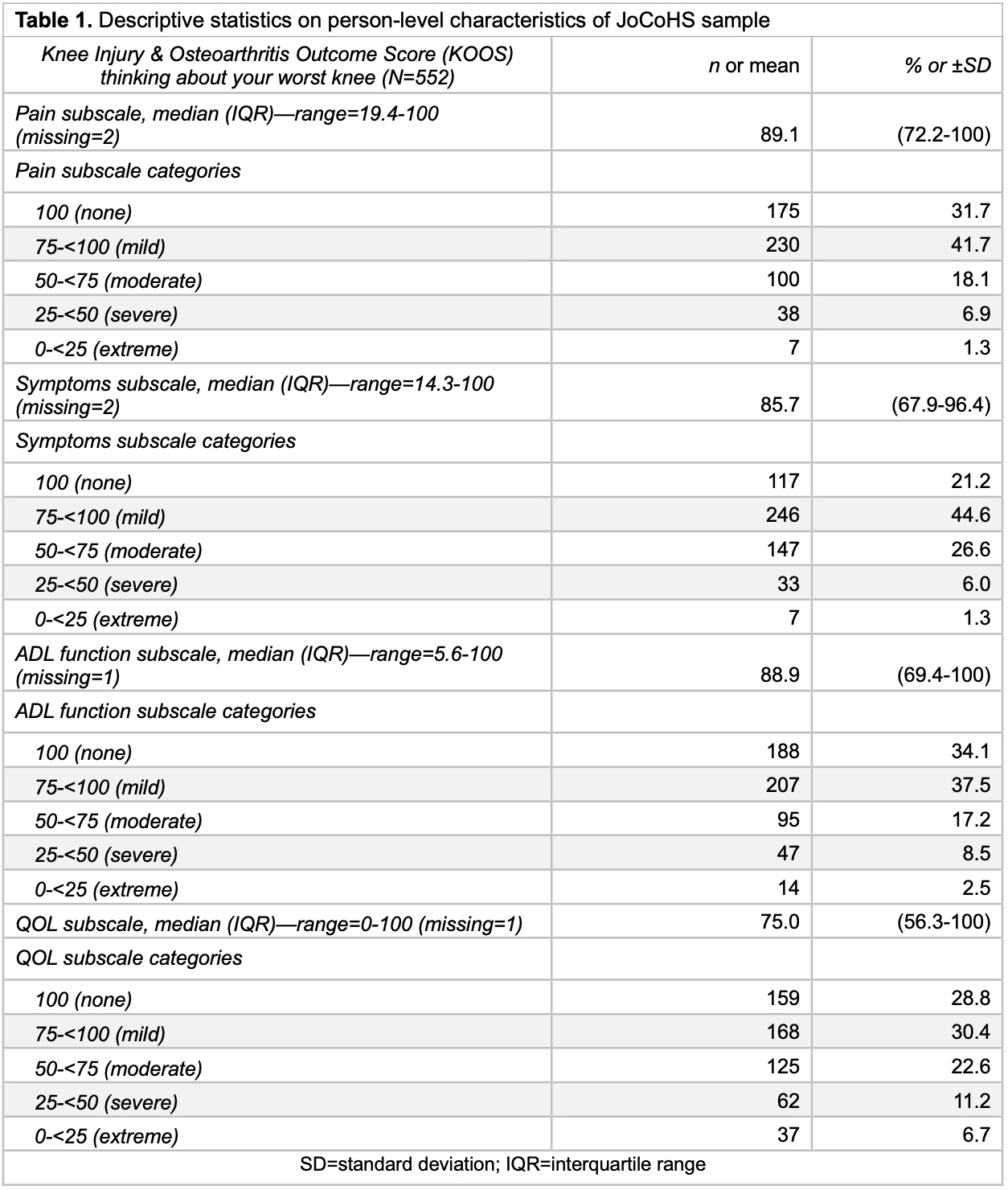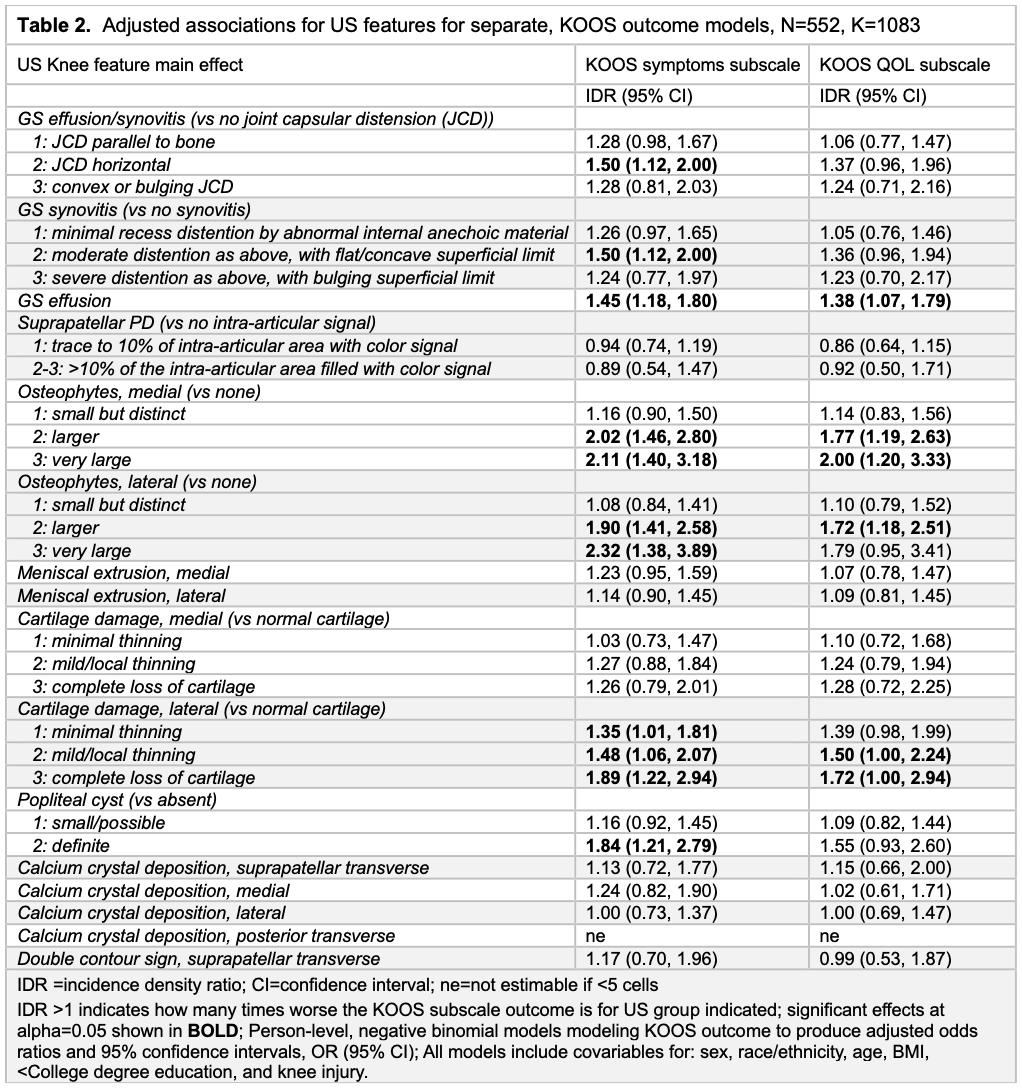Session Information
Session Type: Poster Session B
Session Time: 9:00AM-11:00AM
Background/Purpose: Ultrasound (US) allows for visualization of many features of knee osteoarthritis (KOA) including osteophytes, meniscal extrusion, synovitis, and articular cartilage damage. Additionally, US is more sensitive than radiography and less expensive than MRI. The current analysis aimed to determine the association of features of KOA on US with patient reported symptoms and quality of life.
Methods: The Johnston County Health Study (JoCoHS) is an actively enrolling population-based study in Johnston County, North Carolina built on the infrastructure of the longstanding Johnston County Osteoarthritis Project, but with a focus on younger individuals (35-70) and a range of chronic health conditions. All JoCoHS participants provide demographic information, symptomatic and functional assessments (Knee Injury and Osteoarthritis Outcome Score (KOOS)), and imaging (knee US and multiple joint radiographs). Posteroanterior semi-flexed radiographs are read for Kellgren Lawrence Grade (KLG) by an expert musculoskeletal radiologist (JBR). Standardized knee US images are obtained by a trained sonographer (SSG). Each participant’s set of images is read by 2 randomly selected expert readers (CJB, MJK, JL, JS) with disagreements adjudicated by a 3rd independent reader. For this preliminary analysis, we took the first US read for each participant (complete reads are not yet available). The worst US feature score was defined at the person-level and negative binomial models of KOOS outcomes were used to produce adjusted odds ratios and 95% confidence intervals.
Results: The first 552 individuals (33% men, 23% Black, 9% Hispanic, mean age 55 [range 35-70] years, mean BMI 33.1 kg/m2, 52% with less than a college degree, 33% with previous knee injury) enrolled in the JoCoHS with complete data (1083 knees with at least one US read) were included in this preliminary analysis. About one-third of the knees (330/1083) had radiographic KOA (KLG ≥ 2), while nearly half reported at least some pain, aching, or stiffness. The frequency (n, %) of each of the US features is shown in Table 1.
The symptoms and QOL subscales of KOOS were where participants reported the most impactful effects of KOA. Associations between each US feature with KOOS symptoms and Quality of Life subscales are shown in Table 2.
Except for the presence of suprapatellar power Doppler (PD), all evaluated US features were associated with worse KOOS scores. Participants with large or very large osteophytes, particularly in the medial joint, were more likely to report worse symptoms and quality of life scores. Lateral cartilage damage of any severity was associated with increased symptoms. Findings followed a similar pattern for other KOOS scales and when adjusted for KLG, although statistical significance was attenuated.
Conclusion: US features of KOA, except for suprapatellar PD, are associated with worse KOOS scores. Large and very large osteophytes and lateral cartilage thinning are significantly associated with worse patient reported symptoms and decreased quality of life. Future work will provide more accurate population-based estimates for the presence of these features and their effects on patient reported outcomes.
To cite this abstract in AMA style:
Yates K, Alvarez C, Schwartz T, Savage-Guin S, Renner J, Bakewell C, Kohler M, Lin J, Samuels J, Nelson A. Cross-Sectional Associations of Ultrasound Features with Symptom Outcomes at the Knee: A Community-based Study [abstract]. Arthritis Rheumatol. 2023; 75 (suppl 9). https://acrabstracts.org/abstract/cross-sectional-associations-of-ultrasound-features-with-symptom-outcomes-at-the-knee-a-community-based-study/. Accessed .« Back to ACR Convergence 2023
ACR Meeting Abstracts - https://acrabstracts.org/abstract/cross-sectional-associations-of-ultrasound-features-with-symptom-outcomes-at-the-knee-a-community-based-study/


